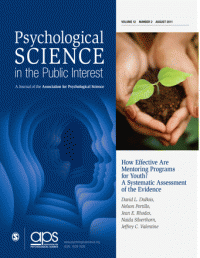Categories
Book Series & Articles
How Effective Are Mentoring Programs for Youth? A Systematic Assessment of the Evidence
David L. DuBois, Nelson Portillo, Jean E. Rhodes, Naida Silverthorn, and Jeffrey C. Valentine
Date: Jul 31, 2011
Source:
Psychological Science in the Public Interest
Introduction:
Mentoring programs for youth are commonplace in today’s society, with more than 5,000 such programs in the United States serving an estimated three million young people (MENTOR/National Mentoring Partnership, 2006). In the typical program, each youth is paired with a volunteer from the community, with the aim of cultivating a relationship that will foster the young person’s positive development and wellbeing. Programs frequently focus on children and adolescents who are perceived to be at risk for poor outcomes in areas such as academics, risk behavior, or health. Accordingly, mentoring has enjoyed relatively wide use as an intervention strategy in diverse spheres of policy and practice, including education, juvenile justice, and public health. The current popularity of mentoring programs notwithstanding, questions remain about their typical effectiveness as well as the conditions required for them to achieve optimal positive outcomes for participating youth. In this report, we use the technique of meta-analysis (i.e., aggregating findings across multiple studies) to address these questions. As backdrop for our analysis, we begin with an overview of recent trends in youth mentoring practice, findings from prior research, and a developmental model of mentoring relationships and their potential effects on young people.


